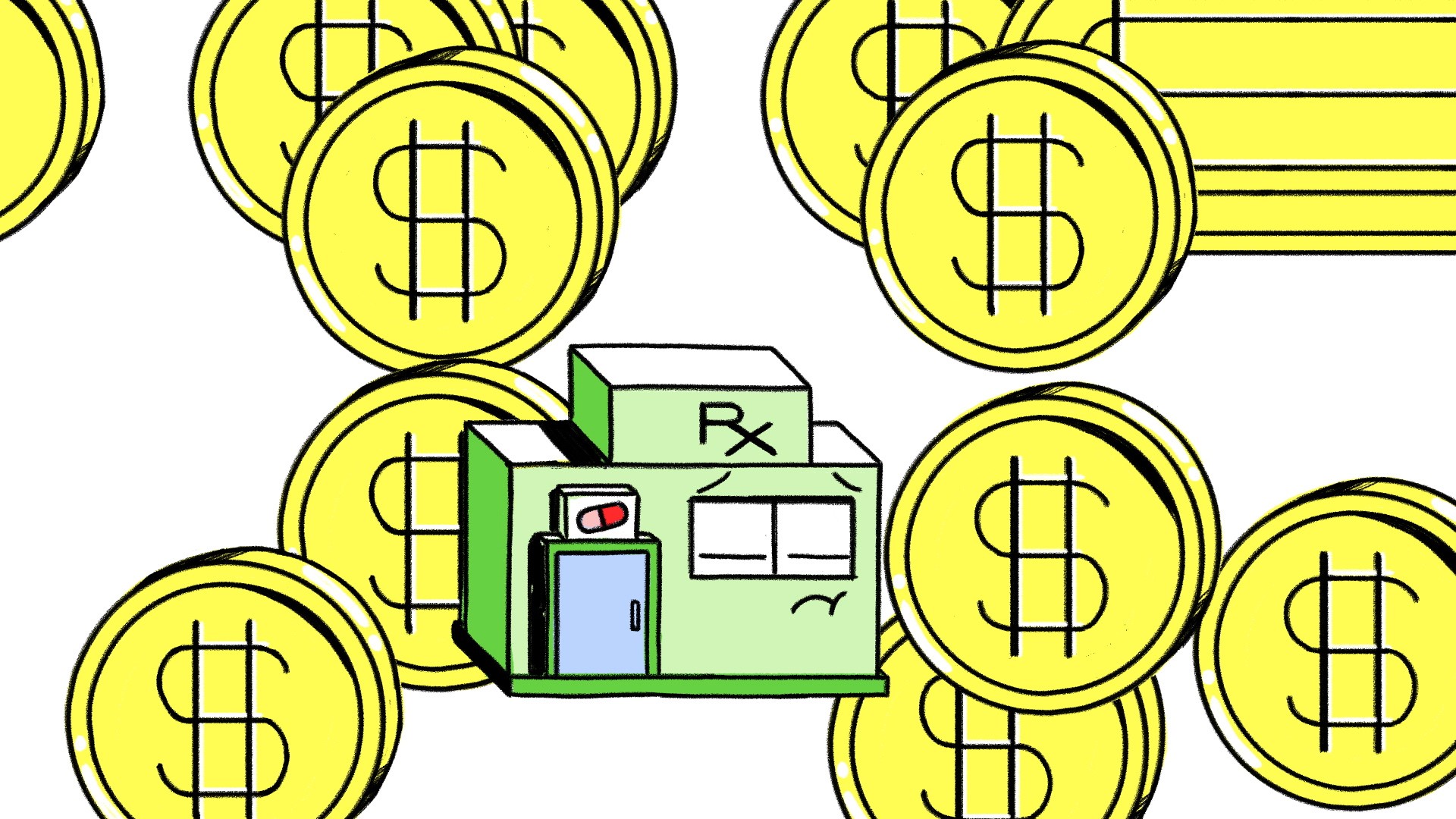Left Image: Photo by George Frey/Bloomberg via Getty Images. Right Image: Adam Gault/Getty Images
The chutzpah was almost impressive. A member of the Sackler family that owns Purdue Pharma—the notorious manufacturer of Oxycontin—recently patented a new form of the anti-addiction drug buprenorphine, according to the Financial Times.Like the apocryphal child who murdered his parents and then pleaded for sympathy because he’d become an orphan, Purdue first profitably pushed an addictive drug, and then apparently sought to make even more money by treating addictions it helped cause. The latest drama in this saga has already shown why, more than ever, America needs tighter and more strictly enforced regulation of drug-makers.“The Sackler family is just as shameless, and only marginally less ruthless, than the drug cartels,” argued Allen Frances, MD, professor emeritus of psychiatry at Duke University and a longtime pharma critic.

After days of being hammered in the press, Purdue executive director of communications Bob Josephson insisted in an email that the company "does not own this patent and we have no intention of profiting from it."But Bloomberg News just reported that the patent may actually be part of a plan to try to win leniency in settlement talks related to over 1,000 lawsuits that have been filed against it, citing "four people familiar with the talks."Meanwhile, the Financial Times also revealed that Purdue long skirted prior attempts to rein it in by secretly owning a major manufacturer of generic opioids known as Rhodes Pharma. Purdue has often minimized its responsibility for the larger crisis by pointing out that only 1.7 percent of opioid prescriptions are written for Oxycontin—even though it is clear that the rise in opioid addiction and overdose began as that product was introduced and heavily marketed. (Regarding the buprenorphine patent, James Doyle, Vice President and General Counsel of Rhodes Pharmaceuticals, said via email, "Rhodes Pharmaceuticals has a patent, but we do not have a developed or approved product, and therefore no money has been made from this technology. The invention behind the buprenorphine patent in question was developed more than a dozen years ago. If a product is developed under this patent, it will not be commercialized for profit.”)But combined, Rhodes and Purdue actually account for 6 percent of opioid sales, making them the seventh largest seller in the US. And, in timing that now looks especially suspicious, Purdue set up Rhodes four months after pleading guilty to mis-marketing Oxycontin in 2007, a crime for which it was fined a mere $600 million. In 2010 alone, Purdue enjoyed $3.1 billion in revenue from Oxy.The real crime here is that many of the most egregious actions of corporations like Purdue are legal—and even those that aren’t rarely get punished by more than a slap on the wrist.With so many lawsuits now filed against opioid manufacturers and distributors by state, local, federal, tribal and private organizations, it’s still possible that this time, Big Pharma will truly be made to pay. But if the past is any guide to what’s coming, the settlements will be minuscule in light of both the harm done and the profit made—and certainly not big enough to serve as an actual deterrent of future violations, rather than an easily written-off cost of doing business.Take the case of atypical antipsychotics, one of the many earlier and egregious examples of pharma impunity. This is a class of medications that, unlike opioids, few people would ever choose to take if they had other alternatives. The drugs, which include Risperdal, Abilify, Geodon, Zyprexa and Seroquel, can cause obesity, diabetes, and movement disorders and have been linked to a shortened lifespan.While they can be helpful for disorders like schizophrenia, bipolar and psychotic depression, those conditions are relatively rare and so instead the drugs are widely used to control behavior in disturbed foster children, children in institutions, and elderly folks with dementia.Just about every major manufacturer that has created and sold one of these drugs has been fined for illegally promoting “off label” use—that is, to treat conditions for which the drug is not approved. Pfizer paid out the biggest settlement: $2.3 billion, for cases related to Geodon and several other drugs. Johnson and Johnson came in second, $2.2 billion for cases involving Risperdal, Invega and one other unrelated drug. Lilly paid out $1.4 billion for mismarketing Zyprexa, while AstraZeneca and BristolMyersSquibb each paid just over half a billion for cases related to Seroquel, Abilify and one unrelated drug. That adds up to some $6 billion.But annually, as of 2012, these drugs collectively generated roughly $15 billion in revenue.So how do we fix a problem that clearly goes far beyond Purdue and Oxy? When calls are made for better regulation and enforcement, the first issue raised is typically banning what is known as “direct-to-consumer” advertising, which allows drug-makers to advertise to patients rather than doctors. Only the US and New Zealand allow it, and a ban seems likely to help in some cases.But Oxycontin was never really advertised directly to patients—I guess there are some limits to the shamelessness of Purdue. The problem here is how it was sold to doctors: This involved beefing up the sales-force (frequently, pretty women like former cheerleaders are recruited by drug companies). And, according to at least one former salesperson, employees were told to target new and inexperienced doctors and look the other way at signs of “pill mills.” Purdue also reportedly gave bonuses to salespeople who could show that they expanded doctors' opioid prescribing in general—not just of Oxycontin, which makes sense in light of the revelation that they were also profiting from generics.To me, it seems insane that any marketing of any controlled substance is permissible—and Frances agreed that such marketing should be banned outright, whether aimed at doctors or consumers. He also suggested criminal charges for executives with significant prison time and much bigger fines. “$600 million was chump change,” for Purdue, he argued.And since we have already given corporations the status of people in America, it is much more reasonable for them to face the equivalent of a death sentence than it is for an individual human. Obviously, such a punishment shouldn't be doled out lightly. But when a company repeatedly lies, pushes drugs that are leaking widely into the illicit market, and does not seem to recognize the damage it's done—or worse—it should be seriously considered. Only breaking up the business and taking away all of the ill-gotten gains seems likely to get corporate executives' attention these days.If we are ever going to have a better regulatory system for pharmaceuticals—including those that have non-medical uses—we need to learn to get this type of oversight right. Prohibition and the drug war have clearly been failures. But commercialization of harmful substances is only slightly better: While supply alone doesn’t cause addiction, promotion of addictive drugs can make them more harmful or switch people from less dangerous to more deadly substances. Perhaps we can dismantle Purdue, and use some of that cash—or at least some of the settlement funds—to develop regulation to prevent drug marketing from wreaking such havoc ever again.Sign up for our newsletter to get the best of VICE delivered to your inbox daily.Follow Maia Szalavitz on Twitter.
Advertisement

After days of being hammered in the press, Purdue executive director of communications Bob Josephson insisted in an email that the company "does not own this patent and we have no intention of profiting from it."But Bloomberg News just reported that the patent may actually be part of a plan to try to win leniency in settlement talks related to over 1,000 lawsuits that have been filed against it, citing "four people familiar with the talks."Meanwhile, the Financial Times also revealed that Purdue long skirted prior attempts to rein it in by secretly owning a major manufacturer of generic opioids known as Rhodes Pharma. Purdue has often minimized its responsibility for the larger crisis by pointing out that only 1.7 percent of opioid prescriptions are written for Oxycontin—even though it is clear that the rise in opioid addiction and overdose began as that product was introduced and heavily marketed. (Regarding the buprenorphine patent, James Doyle, Vice President and General Counsel of Rhodes Pharmaceuticals, said via email, "Rhodes Pharmaceuticals has a patent, but we do not have a developed or approved product, and therefore no money has been made from this technology. The invention behind the buprenorphine patent in question was developed more than a dozen years ago. If a product is developed under this patent, it will not be commercialized for profit.”)
Advertisement
Advertisement
Advertisement
